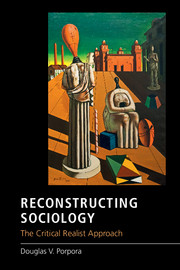Book contents
- Frontmatter
- Dedication
- Contents
- Acknowledgments
- 1 Seven myths of American sociology
- 2 Do realists run regressions?
- 3 What is truth?
- 4 Whatever happened to social structure?
- 5 Are we not men – or, rather, persons?
- 6 What and where is culture?
- 7 Do we need critical realism?
- 8 So what do we do with it?
- Bibliography
- Index
1 - Seven myths of American sociology
Published online by Cambridge University Press: 05 April 2016
- Frontmatter
- Dedication
- Contents
- Acknowledgments
- 1 Seven myths of American sociology
- 2 Do realists run regressions?
- 3 What is truth?
- 4 Whatever happened to social structure?
- 5 Are we not men – or, rather, persons?
- 6 What and where is culture?
- 7 Do we need critical realism?
- 8 So what do we do with it?
- Bibliography
- Index
Summary
What Is Critical Realism (CR) And Who Needs it?
Let us take the second question first. Sociology, particularly American sociology, needs CR. In the United Kingdom (UK) and elsewhere, it is already known. You might need CR as well. Are you unconvinced that a regression equation constitutes an explanation but do not quite know what does? Are you equally incredulous that ethnography and historical narrative do not explain? Maybe you hold the heretical view that not all reality is socially constructed but wonder how to formulate this counter case. Are you perhaps troubled by what various perspectives in sociology do with human personhood – decentering it, dissolving it into discourse, or otherwise deconstructing it? Perhaps you harbor doubts about the posture of value freedom that is supposed to characterize science. If these and other such disquieting thoughts about sociology fail to trouble you, carry on: You do not need CR. Otherwise, you do – at least a discussion about it.
This book is about CR and the contribution it can make to sociology. It is a book for those devoted to sociology who, nevertheless, are troubled by its current guiding assumptions. And sociology does have current guiding assumptions. All intellectual endeavors do. We may not notice them, but they are there. They exist at the level of presuppositions.
Sociologists are good at calling on others to recognize their presuppositions. Presuppositions are important, we tell them, because our presuppositions underlie and shape everything we do. Presuppositions determine what we think about our country and ourselves. They underlie and shape what we think is normal or deviant. Presuppositions shape how we think about criminality and poverty and religion.
Presuppositions are thus crucial to our current behavior and to the most radical changes we can make for the better – in ourselves, in our society, in the world. The word radical comes from the Latin, meaning root. So a radical shift or change is one that begins at the roots. A radical change is thus deeper, more thoroughgoing than one that affects life only farther up the stem. And under the surface, the roots of our thinking are our presuppositions.
- Type
- Chapter
- Information
- Reconstructing SociologyThe Critical Realist Approach, pp. 1 - 30Publisher: Cambridge University PressPrint publication year: 2015



